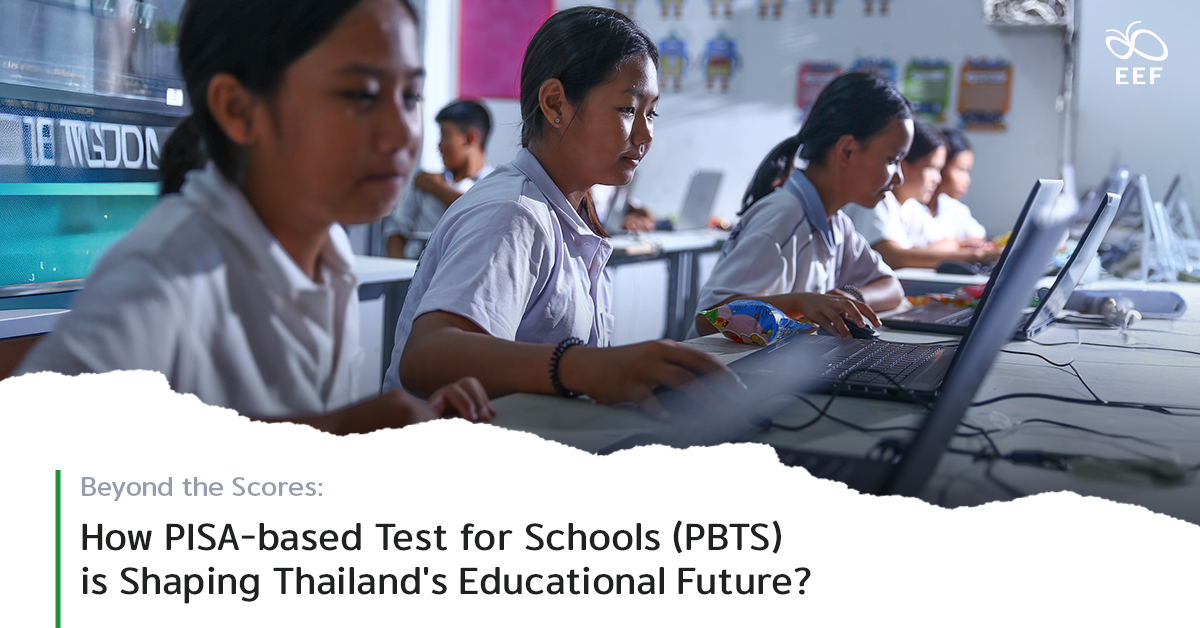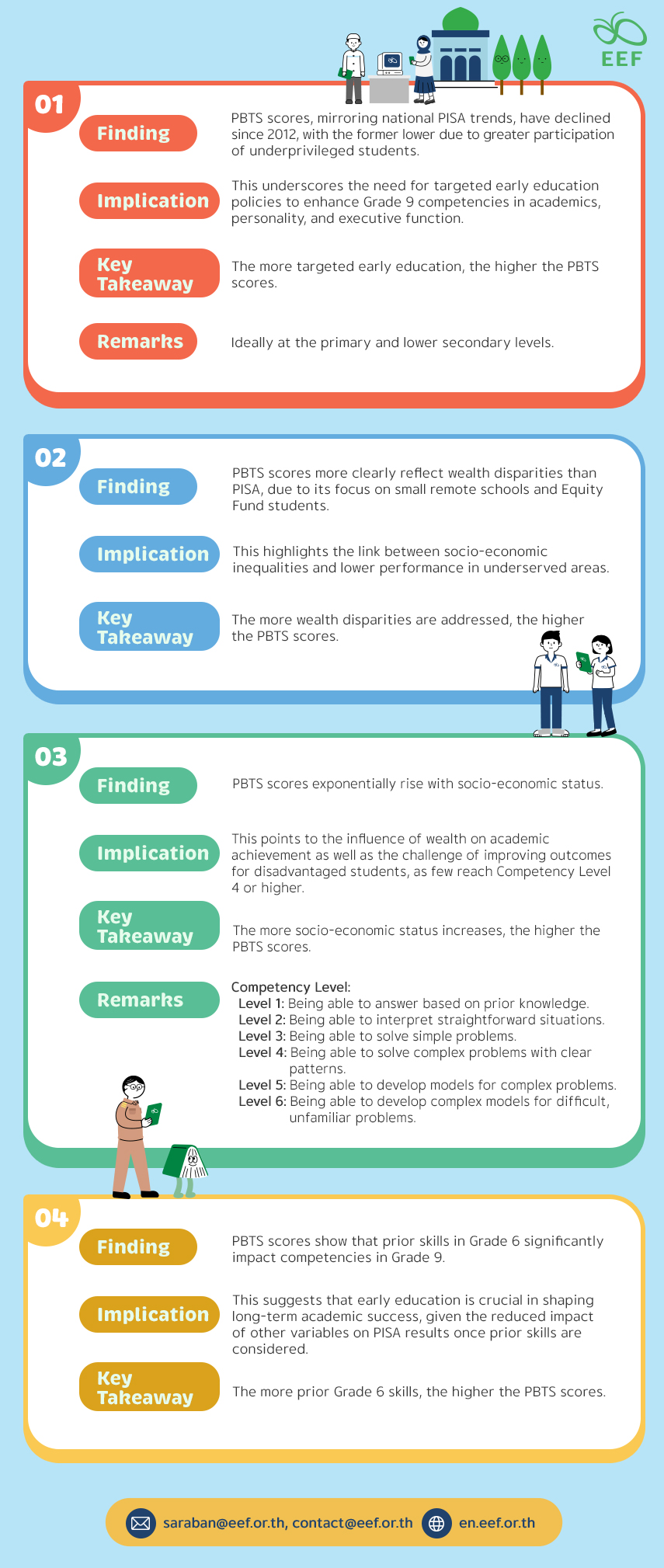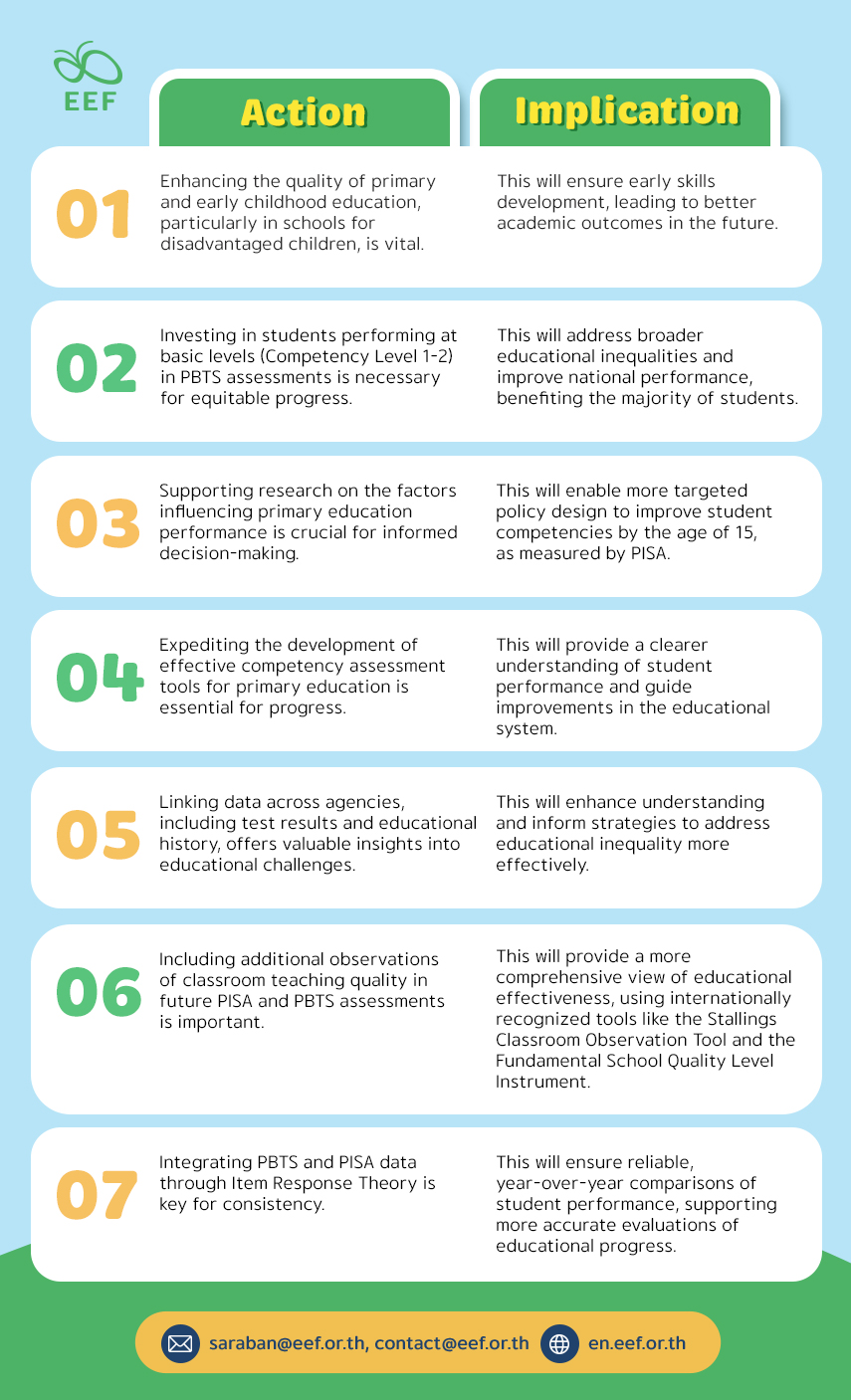
A collaborative project between the Equitable Education Fund (EEF) Thailand and the Research Institute for Policy Evaluation and Design (RIPED) at the University of the Thai Chamber of Commerce (UTCC), the PISA for Schools initiative is now in its second phase. It is designed to evaluate student competencies through the “PISA-based Test for Schools” (PBTS), providing a comprehensive framework for assessing educational quality in alignment with PISA’s international benchmarks. Let us now explore the key findings and insights that have emerged from the report.
2023 PISA-based Test for Schools
*as of Dec 2023 – Jan 2024




This table outlines the various factors that influence PBTS scores, with a strong focus on early education, socio-economic conditions, and cognitive development. It reveals that prior academic performance, particularly skills developed by Grade 6, plays a crucial role in determining later outcomes, emphasizing the lasting impact of early learning. Socio-economic status also emerges as a significant factor, with wealth disparities directly correlating to lower performance, especially in underserved areas. Furthermore, cognitive traits such as executive function, growth mindset, and emotional skills like empathy and self-control are shown to positively affect academic achievement.
The findings highlight that while socio-economic and cognitive factors are influential, interventions that target early education, equity in resource distribution, and the development of cognitive and emotional skills offer the most potential for improving PBTS scores. Additionally, the emphasis on STEM education and effective classroom management underscores the importance of creating supportive and focused learning environments to foster academic success. Therefore, the policy recommendations for improving student competencies and reducing educational inequality are as follows:

The table outlines essential actions to advance primary and early childhood education, focusing on addressing educational disparities. It highlights the need to enhance early education quality in disadvantaged schools to build a strong foundation for future academic success and emphasizes targeted investment in students performing at basic levels to bridge gaps and improve national performance. Rigorous research into factors affecting primary education performance is crucial for evidence-based policy design that targets improvements in student competencies by age 15, as measured by PISA. Additionally, the development of reliable competency assessment tools, alongside linking data from various educational agencies, will offer a holistic view of challenges, enabling more effective strategies to combat inequality. Incorporating classroom teaching quality in assessments, using tools like the Stallings Classroom Observation Tool, and integrating data from PBTS and PISA through Item Response Theory will ensure more consistent, year-on-year comparisons and provide accurate tracking of educational progress. Together, these actions form a comprehensive, data-driven approach to improving educational outcomes and fostering a more equitable system.

The PISA-based Test for Schools (PBTS), led by the Equitable Education Fund (EEF) Thailand, offers more than just a measure of student competencies — it exposes the deeper forces shaping educational outcomes in Thailand. By moving beyond surface-level international benchmarks, the PBTS provides a data-driven lens through which to assess whether the educational system is making meaningful progress or simply shifting numbers. The findings, drawn from over 5,000 Thai 15-year-olds, reveal the critical role of early education, socio-economic disparities, and cognitive development in shaping long-term learning trajectories. Crucially, the PBTS underscores that while Thailand has made strides in aligning with global standards, systemic inequalities remain a barrier to genuine improvement.

The report’s broader implications extend to shaping national educational policy, providing a clearer picture of where the system’s strengths and weaknesses lie. It reinforces the need for interventions that focus not just on test scores but on addressing the root causes of inequality, such as access to quality education in disadvantaged areas. Targeted interventions in early education, STEM, and classroom management emerge as key strategies for bridging these gaps, while the importance of cultivating cognitive and emotional skills like executive function and a growth mindset is also highlighted. By identifying these factors, the PBTS offers concrete, actionable insights that can guide future educational reforms, ensuring that all students, regardless of background, have the opportunity to succeed. This approach reinforces the EEF’s mission to foster a truly equitable and inclusive educational system — one that does not mistake movement for progress but ensures every step leads to lasting change, benefiting the broader Thai society and contributing to a more globally competitive future.
All For Education is all about people; only when all is in for education is Education For All. Join the movement to reduce educational inequality. Support the EEF by donating to fund research, partnerships, and assistance for children, youth, and adults in need of educational support. Click the link to contribute today and help create a society where education is open and equal for all. Together, we can make a lasting impact.

